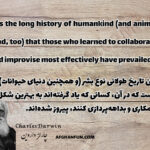Rumi’s QUOTE: “If you are irritated by every rub, how will your mirror be polished?”
If you are irritated by every rub, how will your mirror be polished?
Rumi
Rumi’s QUOTE: “If you are irritated by every rub…” Embrace the Challenge
اگر از هر خراش و ناملایمی برآشوبی، چگونه آینهات شفاف و درخشان خواهد شد؟
مولانا
مولانا در این جمله اشاره میکند که سختیها و ناملایمات زندگی به نوعی مانند خراشهای آینه هستند. اگر بهجای پذیرفتن و یادگیری از این تجارب، فقط آزرده شویم، هرگز به شفافیت و رشد درونی نخواهیم رسید. این چالشها همان چیزی هستند که ما را جلا میدهند و به کمال میرسانند.
QUOTE: Rumi’s Wisdom: “How Can Your Mirror Shine Without Enduring Life’s Rubs?”
Агар аз ҳар харошу нороҳатӣ ба шӯр оӣ, чӣ гуна оинаат равшан ва дурахшон хоҳад шуд?
МАВЛОНО ҶАЛОЛУДДИН МУҲАММАДИ БАЛХӢ
Мавлоно дар ин гуфтор ишора мекунад, ки мушкилот ва сахтиҳои зиндагӣ мисли харошҳои оина ҳастанд. Агар ба ҷои қабули ин таҷрибаҳо ва омӯхтани дарс аз онҳо танҳо озурда шавем, ҳаргиз ба равшании ботинӣ намерасем. Ин мушкилот ҳамон чизҳоеанд, ки моро тоза мекунанд ва ба камол мерасонанд.
QUOTE: “Rumi’s Insight: ‘Life’s Rubs Are What Polish Your Inner Mirror.'”
إذا كنت تنزعج من كل خدش، فكيف سيتلألأ مرآتك وتصبح صافية؟
مولانا جلال الدین محمد الرومي
يشير مولانا هنا إلى أن المصاعب والآلام في الحياة تشبه الخدوش على المرآة. إذا لم نتقبل هذه التجارب ونستفيد منها، فلن نصل أبدًا إلى صفاء النفس. هذه التحديات هي التي تلمع أرواحنا وتجعلها أكثر نقاءً.
“If you are irritated by every rub, how will your mirror be polished?”
Interpretation and Symbolism:
In this profound statement, Rumi uses a powerful metaphor: the mirror and the act of polishing it. The mirror here symbolizes the human soul or inner self, which can only reflect its true brilliance and clarity when it has been polished. However, the process of polishing involves friction, pressure, and even discomfort — which Rumi refers to as “rubs.”
The Role of Challenges in Personal Growth:
Rumi’s words emphasize that the difficulties, challenges, and hardships we face in life are necessary for self-improvement and growth. Just as a mirror cannot shine unless it is polished, our souls cannot reach their full potential without enduring some discomfort. Every “rub” represents life’s struggles, criticisms, failures, or the inevitable pains that one encounters. If we react with irritation to every challenge, we are essentially rejecting the very experiences that shape us into better, wiser, and more resilient individuals.
Acceptance and Transformation:
This quote invites us to shift our perspective on adversity. Instead of viewing challenges as negative obstacles, Rumi suggests embracing them as opportunities for transformation. By accepting the “rubs” with patience and openness, we allow them to polish our inner selves, making us more reflective, compassionate, and self-aware. The metaphor of polishing implies that this process is gradual — it takes time, effort, and persistence. The polished mirror represents the attainment of inner clarity, wisdom, and enlightenment.
Spiritual and Philosophical Context:
Rumi, a 13th-century Persian mystic and poet, often spoke about the journey of the soul toward spiritual perfection. In the Sufi tradition, there is a concept of “tazkiyah” or purification of the soul, where individuals are encouraged to cleanse themselves of ego, pride, and attachments. Rumi’s metaphor aligns with this idea: just as polishing removes the tarnish on a mirror, facing life’s challenges helps cleanse the soul of impurities.
This also relates to the concept of “nafs” (the self or ego) in Islamic mysticism. The “rubs” can be seen as the process of purifying the nafs to reach a state of spiritual purity and self-awareness. By enduring hardship and responding with patience rather than irritation, one can reach a state of inner peace and enlightenment.
Psychological and Practical Implications:
From a psychological perspective, Rumi’s insight is timeless and highly relevant today. Modern psychology often speaks about the value of resilience and the concept of “post-traumatic growth.” Rather than succumbing to negativity in the face of adversity, individuals who embrace challenges and learn from them tend to emerge stronger, more capable, and more fulfilled. The friction we encounter is essential for honing our character, much like how resistance is needed to strengthen muscles.
Rumi’s message is also a call for emotional maturity. If we allow ourselves to be constantly irritated or overwhelmed by minor setbacks, we remain trapped in a cycle of negativity and self-pity. By cultivating patience, acceptance, and inner strength, we can transform these experiences into sources of growth, much like how polishing transforms a dull surface into a reflective one.
Conclusion:
Rumi’s quote is a timeless reminder that the path to self-improvement and spiritual fulfillment is not smooth. It requires us to embrace life’s challenges as necessary components of our journey toward clarity and wisdom. By understanding that each “rub” is an opportunity for growth, we can transform our perspective on adversity and cultivate a deeper sense of inner peace.
In essence, Rumi teaches that it is through facing and overcoming life’s trials that our true brilliance is revealed — just like a mirror that shines only after it has been polished.











